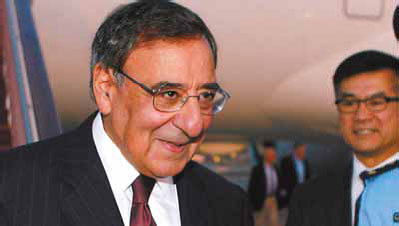US 'will not take sides over islands'
Updated: 2012-09-18 08:07
By Zhao Shengnan and Zhang Yunbi (China Daily)
|
||||||||
|
US Defense Secretary Leon Panetta arrives in Beijing on Monday evening after a visit to Japan. Larry Downing / Agence France-Presse |
Panetta arrives for meetings amid rising tensions
Washington will not take sides over the Diaoyu Islands and urges a peaceful resolution amid escalating tension, US Defense Secretary Leon Panetta said in Tokyo on Monday before arriving in Beijing.
Speaking after meetings with senior Japanese figures, Panetta called for "calm and restraint on all sides" and "diplomatic means" to resolve the issue. Tension reached a new high with protests in China after Tokyo completed its so-called "purchase" of the islands from "private owners" last week.
"It's in everybody's interest for Japan and China to maintain good relations and to find a way to avoid further escalation," Panetta said and warned that misjudgment could have serious consequences.
The Pentagon chief is scheduled to meet State and military leaders in Beijing, including his counterpart Liang Guanglie before heading for Qingdao, in East China's Shandong province. The four-day visit is Panetta's first visit to China since taking office in July 2011.
According to the Defense Ministry, he will hold a joint news conference after meeting with Liang on Tuesday and visit a military academy in Beijing on Wednesday.
Panetta's week-long Asian tour, the third in 11 months, originally only included stops in China and New Zealand.
Despite Panetta casting himself as a mediator between China and Japan over the islands in an interview with Foreign Policy magazine, his unexpected trip to Japan is aimed at bolstering the US ally by prioritizing coordination with Tokyo before coming to China, analysts said.
Panetta repeated that the US, as a matter of policy, does not take a position on the islands, but he said that the US commitment to Japan, in the form of a mutual defense treaty, was "longstanding, and that does not change".
Japanese Foreign Minister Koichiro Gemba, who met with the former CIA chief on Monday, echoed the remarks, saying Washington and Tokyo agreed that the islands were covered by the treaty.
Wang Fan, director of the Institute of International Relations at the China Foreign Affairs University, said Washington may be playing a risky game.
"Washington, with its bias and rebalancing in the region, has been seeking to benefit through simultaneously utilizing, and reining in, the tension between China and Japan. Such moves pose a threat to regional stability and increase the risk of drastic escalation," he said.
Washington cannot shake off its responsibility for sowing the seeds of conflict, since provocations by its allies against China have been emboldened by the US "Pivot to Asia" policy, Xinhua News Agency said in a commentary.
"The success of Panetta's visit will be judged by how he will reassure Beijing that Washington is willing to do more things conducive to regional peace and stability, which are now threatened by some US allies," it said.
Panetta's visit, following Liang's trip to the US in May, is also a part of efforts to push military relations forward since they resumed 18 months ago after a break over US arms sales to Taiwan, analysts said.
Military relations will be a key aspect of the visit, but obstacles remain.
Ni Feng, a researcher of American Studies at the Chinese Academy of Social Sciences, said that these include US arms sales to Taiwan, military surveillance close to China's coast and discriminatory regulations prohibiting certain China-US military exchanges.
Both countries are looking for ways to deepen China-US military relations, but ensuring smoother communication is a more practical option, Ni said.
"Yet whether these talks turn out to be fruitful remains to be seen." Yin Zhuo, a Beijing-based military specialist, said Panetta will also touch upon international issues including the denuclearization of Korean Peninsular, the Iranian nuclear plan and Syria.
Contact the writers at zhaoshengnan@chinadaily.com.cn and zhangyunbi@chinadaily.com.cn

 Relief reaches isolated village
Relief reaches isolated village
 Rainfall poses new threats to quake-hit region
Rainfall poses new threats to quake-hit region
 Funerals begin for Boston bombing victims
Funerals begin for Boston bombing victims
 Quake takeaway from China's Air Force
Quake takeaway from China's Air Force
 Obama celebrates young inventors at science fair
Obama celebrates young inventors at science fair
 Earth Day marked around the world
Earth Day marked around the world
 Volunteer team helping students find sense of normalcy
Volunteer team helping students find sense of normalcy
 Ethnic groups quick to join rescue efforts
Ethnic groups quick to join rescue efforts
Most Viewed
Editor's Picks

|

|

|

|

|

|
Today's Top News
Health new priority for quake zone
Xi meets US top military officer
Japan's boats driven out of Diaoyu
China mulls online shopping legislation
Bird flu death toll rises to 22
Putin appoints new ambassador to China
Japanese ships blocked from Diaoyu Islands
Inspired by Guan, more Chinese pick up golf
US Weekly

|

|








